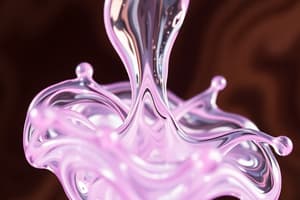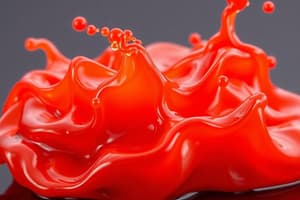Podcast
Questions and Answers
What is the definition of Rheology?
What is the definition of Rheology?
- The study of chemical reactions in fluids
- The study of the color properties of matter
- The study of the temperature properties of matter
- The study of the flow and deformation properties of matter (correct)
Why is Rheology important?
Why is Rheology important?
- It is important for understanding fluid flow behavior in different industries (correct)
- It is important for understanding the color properties of matter
- It is important for understanding chemical reactions in fluids
- It is important for understanding the temperature properties of matter
What do fluids do in response to applied stress called shear stress?
What do fluids do in response to applied stress called shear stress?
- Change color
- Move (correct)
- Undergo chemical reactions
- Change temperature
What is the intrinsic property of a fluid called, which is determined by plotting Shear Stress versus change in V/L?
What is the intrinsic property of a fluid called, which is determined by plotting Shear Stress versus change in V/L?
What law is used to describe dynamic viscosity?
What law is used to describe dynamic viscosity?
Which type of fluid exhibits shear thickening behaviour?
Which type of fluid exhibits shear thickening behaviour?
What is the defining characteristic of a thixotropic material?
What is the defining characteristic of a thixotropic material?
What property does elasticity refer to?
What property does elasticity refer to?
What is the main difference between rheology and viscosity?
What is the main difference between rheology and viscosity?
How does the dynamic viscosity change in a pseudoplastic material as the rate of shear increases?
How does the dynamic viscosity change in a pseudoplastic material as the rate of shear increases?
Flashcards
What is Rheology?
What is Rheology?
The study of how matter flows and deforms under stress.
Why is Rheology important?
Why is Rheology important?
Understanding how fluids behave is crucial in many industries.
What do fluids do under shear stress?
What do fluids do under shear stress?
Fluids move in response to a pushing force called shear stress.
What is dynamic viscosity?
What is dynamic viscosity?
Signup and view all the flashcards
What is Newton's Law of Viscosity?
What is Newton's Law of Viscosity?
Signup and view all the flashcards
What is a dilatant fluid?
What is a dilatant fluid?
Signup and view all the flashcards
What is a thixotropic material?
What is a thixotropic material?
Signup and view all the flashcards
What does elasticity refer to?
What does elasticity refer to?
Signup and view all the flashcards
What's the difference between rheology and viscosity?
What's the difference between rheology and viscosity?
Signup and view all the flashcards
How does viscosity change in a pseudoplastic material?
How does viscosity change in a pseudoplastic material?
Signup and view all the flashcards
Study Notes
Rheology Definition
- Rheology is the study of the flow and deformation of materials, particularly fluids, under applied stress.
Importance of Rheology
- Rheology is important because it helps understand the behavior of materials in various industrial and biological processes, such as manufacturing, processing, and biological systems.
Response to Shear Stress
- Fluids respond to applied stress, known as shear stress, by deforming and changing their shape.
Intrinsic Property of Fluids
- The intrinsic property of a fluid, determined by plotting Shear Stress versus change in V/L, is its viscosity.
Dynamic Viscosity
- The dynamic viscosity of a fluid is described by Newton's Law of Viscosity, which states that the shear stress is proportional to the shear rate.
Shear Thickening Behavior
- A type of fluid that exhibits shear thickening behavior is a dilatant fluid, which becomes more viscous when subjected to increasing shear stress.
Thixotropic Materials
- The defining characteristic of a thixotropic material is that it becomes less viscous when agitated or shaken and returns to its original viscosity when left still.
Elasticity
- Elasticity refers to the property of a material that allows it to return to its original shape after the removal of an applied stress.
Rheology vs. Viscosity
- The main difference between rheology and viscosity is that rheology is the study of the flow and deformation of materials under stress, while viscosity is a measure of a fluid's resistance to flow.
Pseudoplastic Materials
- In a pseudoplastic material, the dynamic viscosity decreases as the rate of shear increases.
Studying That Suits You
Use AI to generate personalized quizzes and flashcards to suit your learning preferences.



